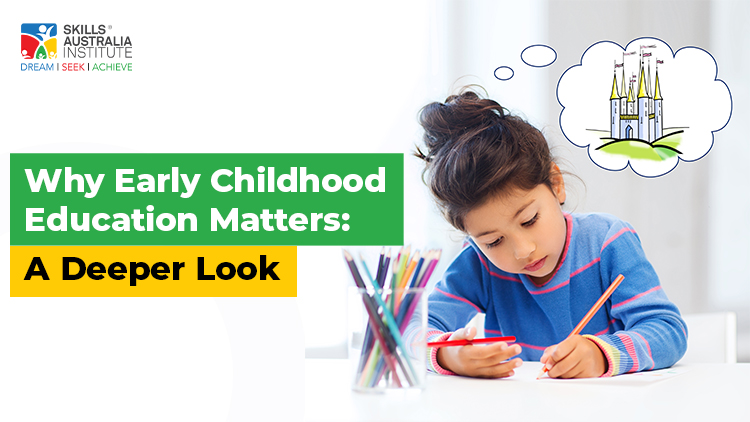- About
- Courses
- International Students
- Domestic Students
- Student Services
- Agents
- Contact

Early childhood education in Australia lays the foundation for a child’s future development and success. In Australia, recognizing the importance of early childhood education has become paramount as policymakers, educators, and parents alike understand its profound impact on a child’s cognitive, social, and emotional well-being. In this article, we delve into why early childhood education matters in Australia, exploring the key aspects that make it a critical component of a child’s overall growth and preparing them for a successful future.
In Australia, the pursuit of excellence in early childhood education is facilitated through various specialised courses. Education institutes nationwide offer comprehensive vocational courses tailored to aspiring educators and childcare providers. Courses such as the CHC30121 Certificate III in Early Childhood Education and Care equip individuals with foundational skills focusing on child development and care.
For those aspiring to take on leadership roles, the CHC50121 Diploma of Early Childhood Education and Care is a valuable qualification, often supported by government funding initiatives. These courses enhance practical knowledge and emphasise the significance of creating inclusive and nurturing environments for children. One can also opt for a diploma in early childhood education government funding typically offered by registered training organisations (RTOs) nationwide. In a dynamic field like early childhood education, these courses are pivotal in preparing professionals to contribute meaningfully to the next generation’s cognitive, social, and emotional development.
Given below are some reasons why early childhood education is important:
The early years of a child’s life are characterised by rapid brain development. The neural connections formed during this period are the building blocks for later learning and behaviour. High-quality early childhood education provides:
In Australia, initiatives like the Early Years Learning Framework (EYLF) emphasise play-based learning to foster cognitive growth, ensuring that children are well-equipped for the challenges of formal education.
Early childhood education goes beyond academics; it plays a pivotal role in shaping a child’s social and emotional intelligence. Children learn to navigate social interactions, develop empathy, and build resilience in a well-designed ECE setting. These skills form the foundation for healthy relationships, effective communication, and emotional well-being. By promoting a positive and inclusive environment, Australian ECE programs contribute to the holistic development of children, nurturing their ability to connect with others and thrive in diverse social settings.
Australia is a culturally diverse nation, and early childhood education is an opportune time to instil cultural competence and appreciation for diversity. ECE programs in Australia incorporate cultural perspectives and celebrate differences, fostering an inclusive environment where children learn to respect and embrace various backgrounds. This early exposure to diversity prepares children for a globalised world, promoting understanding and collaboration across cultures.
Early childhood education courses act as a bridge between home and formal schooling. It introduces children to routines, structure, and basic educational concepts, smoother the transition to primary school. Australian Early Childhood Education programs focus on developing foundational literacy and numeracy skills, ensuring that children are ready for the academic challenges they will face in subsequent years. Moreover, early exposure to learning environments helps identify and address potential learning difficulties, ensuring children receive timely support.
Investing in childcare courses in Australia yields significant long-term benefits for individuals and society. Research consistently shows that children participating in high-quality ECE programs are more likely to succeed academically, graduate from high school, and pursue higher education. This, in turn, leads to increased employability and economic productivity. Child care courses in Perth aim to create a community of well-educated and skilled workforce that contributes to national development and competitiveness.
Early childhood education plays a crucial role in breaking the cycle of disadvantage that may be present in some families. Quality ECE programs, especially those prioritising access for disadvantaged communities, provide children with equal opportunities to thrive. By addressing disparities in early education, Australia aims to create a more equitable society, ensuring every child has a fair chance at a successful future, regardless of their socio-economic background.
Effective early childhood education is not solely the responsibility of educators and institutions; parental involvement is equally vital. Australian ECE programs encourage parents to participate in their child’s learning journey. This collaborative approach strengthens the bond between parents and children, creating a supportive environment for the child’s overall development. Parental engagement also extends the learning experience beyond the classroom, reinforcing the importance of education in the home environment.
Early childhood education is not just about academic and social development; it also contributes to the physical well-being of children. ECE programs in Australia prioritise healthy habits, including nutrition and physical activity. By instilling these habits early on, children are more likely to adopt a healthy lifestyle, reducing the risk of obesity and related health issues. Moreover, focusing on mental health and well-being helps children develop resilience and coping strategies, contributing to their happiness and success.
Early childhood education is a cornerstone of a child’s development in Australia, with far-reaching implications for their future and the well-being of society as a whole. The emphasis on cognitive, social, and emotional growth, coupled with a commitment to diversity and inclusivity, positions Australian ECE programs as critical contributors to the nation’s educational landscape. As we recognize the multifaceted impact of early childhood education, it becomes clear that investing in the early years is not just an educational imperative but a societal responsibility, shaping the next generation of informed, capable, and compassionate individuals.